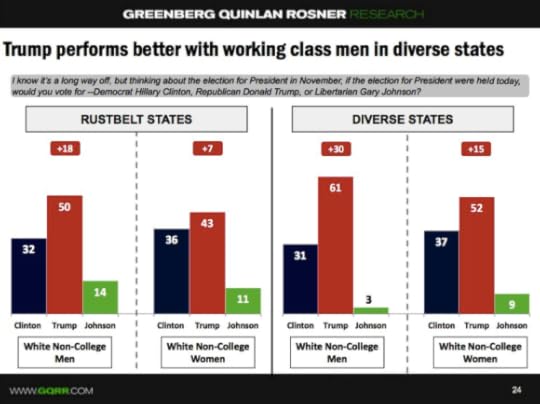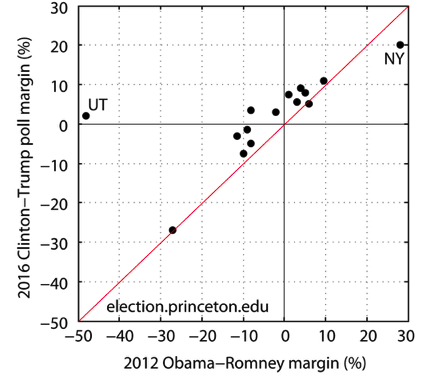Helen H. Moore's Blog, page 719
July 14, 2016
The sad incurious case of Mike Pence: Why he’s a perfect fit for Donald Trump
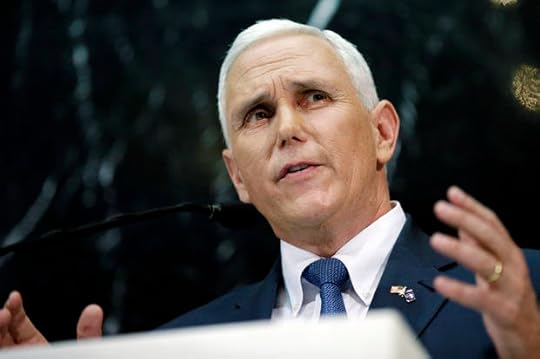
Mike Pence (Credit: AP/Darron Cummings)
The Donald Trump veepstakes reached a fever pitch on Wednesday. Thanks to mechanical issues with his private jet, Trump was stuck in Indianapolis for the day. The result was a frenzy, as would-be VP’s boarded planes and scurried to Indiana for a few minutes of audition time before Trump makes his official announcement Friday morning.
A lowly pool has been reduced to four B-list candidates: Mike Pence, Newt Gingrich, Chris Christie, and Jeff Sessions, three of whom found their way to Indianapolis on Wednesday (Christie reportedly spoke with Trump over the phone). You could make a case for all four. As I wrote last week, both Newt and Christie are plagued by scandals (much like Trump) and have bottomed out as politicians. Neither has much to lose at this point, which makes joining Trump’s dumpster fire campaign less risky. Sessions is a largely unknown conservative senator from Alabama. An anti-immigration culture warrior, he was among the first Republicans to publicly endorse Trump. But he’s the obvious outsider here. Of the final four, Sessions seems least likely to get the nod.
Although it’s still unofficial, The Washington Post is reporting that Pence is the pick. If true, that makes the most sense for Trump, and here’s why.
First, we have to remember that Trump’s campaign is essentially a TV production. As such, he needs a hype man, someone who can pump propaganda without overshadowing the star of the show. Newt is shameless enough to do this, but his penchant for pomposity will invariably threaten Trump. Newt is too impressed with Newt to take a backseat to anyone. Christie, for all his faults, is a very gifted politician. But he’s also loud and aggressive and his personality may eclipse Trump’s in the course of a campaign. The Republican nominee wants an “attack dog,” but not someone who can upstage him. Both Gingrich and Christie, in their own ways, are capable of this.
Pence, however, appears quite comfortable playing second fiddle, and he clearly wants the job. He’s prostrated himself before Trump, lobbying about as hard as any candidate I’ve seen. And his Twitter feed is littered with over-the-top pleas. “We will not rest until we elect @realDonaldTrump as the next President of the United States,” reads one tweet. “Donald Trump knows that the boundless potential of the American People awaits,” another one says. “Donald Trump knows that we can make America great again,” yet another says. This is what a grown man groveling for attention – and a job – looks like.
Normally, VP nominees feign indifference, dismissing inquiries or referring reporters to the presidential candidates. The idea is to express interest without careening into desperation. But this is not how Pence rolls. Behold his introduction speech for the Republican nominee earlier this week at a rally in Westfield, IN. Here we see the Platonic form of the political hype man. His first sentence set the tone: “My fellow Hoosiers, we are 119 days away from a great victory in the United States of America when Indiana becomes the first state on the board to make Donald Trump the 45th president of the United States of America.” Right out of the gate, Pence lavished praise on Trump, making it all about him.
But then he donned his bootlicker cape and went full ham: “You know, Donald Trump understands the frustrations and the hopes of the American people like no other American leader in my lifetime since Ronald Reagan…Donald Trump gets it. Donald Trump hears the voice of the American people. He’s been successful on Wall Street but he’s never turned his back on Main Street. He’s never forgotten or forsaken the people who work with their hands, who grow the good, build our roads and bridges, tend to our sick, teach our kids.”
This would be pathetic if it wasn’t so patently absurd.
If Pence believes Trump is the greatest leader since Reagan, why did he endorse Ted Cruz for president 10 weeks ago? Trump “never turned his back on Main Street”? We know Trump loves “the poorly educated,” but I doubt that’s what Pence means by “Main Street.” We know Trump has outsourced much of his labor in order to cut costs and avoid paying American workers a livable wage. Was that a boon for “Main Street?” We know that Trump inherited $40 million dollars from his father and has now convinced hordes of working-class whites that he feels their pain and knows their struggle. Perhaps that’s what Pence is referencing here.
It’s probably best not to analyze Pence’s remarks too closely. They’re not supposed to make sense. This was a performance, and Pence, a former talk radio host, knows how to perform. The goal was to show Trump how effectively he can wag the pom poms. On that score, he succeeded.
There’s another, perhaps more obvious reason why Pence wants this job: He might lose his. After his disastrous attempt to impose the anti-LGBT Religious Freedom Restoraction Act on Indianans in 2015, Pence’s popularity has plummeted. Even the business community turned against him. According to a May poll, his approval rating is down to 40 percent, with only 60 percent of Republicans supporting his re-election. The Indiana GOP would be happy to dispense with Pence and make way for a more attractive candidate.
In any event, a man this shameless in his pursuit of the nomination suits Trump well. Trump likes lackeys, and he appears to have found one in Pence. And because he’s staring down defeat in his home state, a VP nomination is an escape hatch for the Indiana governor, a chance to skirt failure and boost his national brand. Pence is also a safe pick with less baggage than Newt and Christie and a fair amount of experience on Capitol Hill. In addition to bowing to Trump, he’ll appeal to social conservatives and bring message discipline to a campaign without any.
So Pence might not be the sexiest pick for Trump, but he’s the safest. And considering the paucity of respectable candidates willing to stand on a stage with Trump, this is as good as it gets.
July 13, 2016
“Science fiction cyber-war is here”: Alex Gibney on “Zero Days” and Stuxnet, the secret weapon that got away
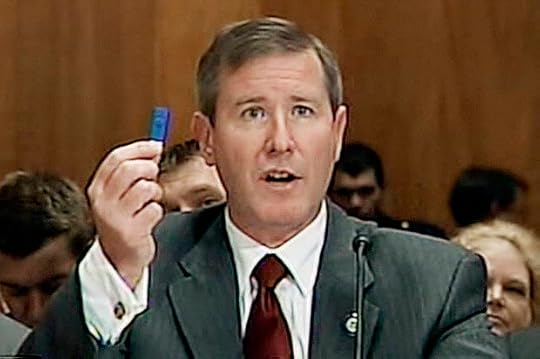
Former Homeland Security cybersecurity chief Sean McGurk testifying to Congress about the Stuxnet virus, from "Zero Days." (Credit: Magnolia Pictures)
Alex Gibney has made documentaries about Enron and the Church of Scientology and pioneering gonzo journalist Hunter S. Thompson and Jack Abramoff, the über-lobbyist who corrupted American politics more than any other individual. (That film went almost unnoticed by the larger world, which tells you something. It isn’t something good.) Most notably, Gibney won an Oscar for blowing the whistle on the Bush administration’s torture policies with the devastating exposé “Taxi to the Dark Side,” one of those “Inconvenient Truth” moments when a documentary can shift public opinion and shape policy.
But none of Gibney’s movies since that one, and perhaps none at all, have explored a secret as deeply buried or as important as the one he explores in “Zero Days,” which just opened in New York and Los Angeles with wider national release to follow. As he explains it now, Gibney set out to make a “small film” investigating a strange news story that many of us noticed around 2010 and rapidly forgot about again. (Quite likely because it was too troubling, and too difficult to understand.) That was the discovery of an anomalous piece of computer malware that data engineers dubbed Stuxnet, which was far more sophisticated than those used in ordinary cyber-crime attacks and had shown up in computer systems all over the world.
It rapidly became clear that Stuxnet had to be the work of a “state actor,” to use the relevant term of art, rather than the work of hackers in Estonia or East L.A. who simply wanted to steal credit card numbers or make a political statement. Some intelligence agency somewhere had designed and perfected Stuxnet to perform a particular purpose. But who was that, and what was it meant to do? In “Zero Days,” Gibney shows a clip from a Senate hearing at which Sen. Joe Lieberman asks Seán McGurk, who then headed the Department of Homeland Security’s cybersecurity unit, exactly that question. McGurk assures Gibney during a subsequent interview that he was telling the truth when he responded that he didn’t know who had designed Stuxnet, and what its real purpose was.
He wasn’t meant to know, of course, because Stuxnet — or Olympic Games, to use its NSA codename — was a secret weapon built by the United States government. To get more specific, it was a weapon jointly designed by U.S. and Israeli intelligence, meant to infect the supposedly secure computer system at Iran’s nuclear enrichment facility. It targeted a specific brand and model of electronic controller called a PLC, in effect overriding the unit’s safety features and causing nuclear centrifuges to spin out of control until they broke apart or exploded.
O.G., as NSA technicians called it, had done its job, perhaps delaying Iran’s nuclear program for a year or more while engineers struggled to figure out what diabolical gremlin was causing repeated failures and breakdowns. As one Israeli general observes in the film, it was a weapon of ingenious design, meant to remain invisible and cause the Iranians to question their own capabilities. But the Israelis, at least according to the story told by anonymous NSA sources in “Zero Days,” wanted more. So against the wishes of their American partners, and perhaps without their knowledge, Israeli intelligence designed and released a juiced-up version of O.G. known as Nitro Zeus, which spread itself from machine to machine and network to network far more aggressively.
It was that second, Israeli-modified version that escaped from containment, infected computer networks all over the world, and introduced all of us to the idea that cyber-warfare was more than a metaphor or a science-fiction plot device. That was the one that became known as Stuxnet, after an enterprising computer engineer in Ukraine identified it and technicians at Symantec spent months picking it apart. And as with nuclear weapons and chemical weapons and drones, once the genie was out of the bottle there was no way to put it back.
Within months, Russian intelligence and Chinese intelligence and Iranian intelligence were using the revelation of Stuxnet to design their own cyber-weapons with real-world effects. Since 2012 there have been several waves of cyber-attacks on American and European banks, variously blamed on the Iranians, the North Koreans and “non-state actors” who may or may not be allied with those governments or with terrorist groups. Essentially your tax dollars and mine paid for the development of a secret weapons program that has never been the subject of public discussion or debate, which was then used against a country with which we are not at war, with little consideration of what the blowback or long-term consequences might be once it wasn’t a secret anymore.
Cyber-warfare is not the sexiest or most photogenic form of warfare, and is poorly understood by the public. But that’s pretty much the point. “Zero Days” is a weapon too, arguably, or at least a tool meant to pry open the lid on this issue and enable discussion of an extraordinarily dangerous issue that is likely to define international conflict in our century. I spoke to Gibney on the phone just before his film opened in New York.
Alex, you obviously had a lot of trouble getting anyone in the intelligence community to talk about Stuxnet, or O.G., as they called it. How have folks in that world responded to the film?
Well, it’s about the same response I got when I asked questions. There’s been kind of a deafening silence. I don’t know quite how to interpret that. There’s part of me that thinks they’re pissed off and horrified about another leak. There’s part of me that thinks that this was the kind of leak that they like, particularly in the Obama administration, because it shows them being tough. It’s hard to know.
This strikes me as one of the most important issues that you’ve covered in a film, but also one that is particularly difficult to summarize, and for people to get their heads around. Do you think that’s true?
I do think that’s true. When people start to think about computer code their eyes kind of glaze over. It doesn’t feel like it’s flesh and blood, even though the implications are pretty profound. I think it’s kind of getting into that weird territory where suddenly we realize how connected we are, and therefore how vulnerable we are in a way that nobody ever thought about before. One thing I heard last night was they’re now teaching people in the Navy how to navigate by sextant again. The reason being that they figure during a conflict all the sophisticated electronic communications will be jammed or shut down or compromised by malware, and they’ll need to go back to the old school.
Right. I think you’re making the case here that this is really about the interaction between computer networks and the physical world. Which has always existed and to some degree was always the point. But people have this reaction, “Oh, they’re gonna steal my data. Big deal. I can get a new credit card tomorrow, and who cares if the government reads my email.” And this is about something ultimately much bigger and more threatening than that.
That’s right. And that’s what Stuxnet was. That’s the origin story of Stuxnet. There were other kinds of cyber-attacks and cyber-weapons prior to Stuxnet, but Stuxnet represents the Zero Day, in a more metaphorical sense, meaning the moment when code crossed the threshold from the cyber realm to the physical realm and started taking control of machines. That’s the vulnerability that nobody really ever thought about. The idea that we had all of this infrastructure and all of this machinery but we blithely connected it to the internet, thinking, “Oh, that’s a really good thing. It’ll make it more efficient.” But it also made it much more vulnerable.
So yes, it’s the connection between the cyber world and the physical world that makes these weapons so powerful. That and the fact that — I think Michael Hayden [former head of CIA and NSA] makes this point in the movie — because it comes out of the espionage world, there’s almost the de facto view that it should be secret, and then it’s both a spying tool and a weapon. And that’s also a little bit scary. So it’s taking the spying element, which we know from Snowden and all of that, but taking it one step further.
Yeah. There’s the point made by Richard Clarke, who was the counterterrorism czar under George H.W. Bush and Bill Clinton. Ultimately we decided, as a society, that biological, chemical, and nuclear weapons were so dangerous that they demanded political control and a fairly high degree of transparency. How do you deal with that in this case, when you’re talking about weaponized computer code? It’s uniquely difficult.
It’s very difficult in this case, because of what the Symantec guys point out [in the film], which is that it’s very hard to do attribution in cyber. On the other hand, it’s not impossible, and I think Richard Clarke’s point is a good one. A lot of people said the other agreements [on other types of weapons] were impossible also. What would happen if people breached those agreements? And so on. There are technical solutions, but beyond that, the bigger problems here are moral, legal, and precedential. You can look at Stuxnet and say, “What a brilliant device. How clever. How genius to upend the Iranian nuclear system to forestall Israel from bombing and to do so with a device that is so smart and so secret and uses that ‘Ocean’s Eleven’ capability to make the Iranians think that it’s their fault.” Genius!
But not so genius when you put it in the context of having launched a weapon and having used it at a moment where now everyone can do it. And we’ve established a norm of behavior that’s not a particularly good one, which is, as Gary Brown says, “Do what you can get away with.” I don’t know if you noticed this in the news, but the Department of Justice charged a number of named Iranians in the cyber attack on U.S. banks. Well apparently, there are a lot of people in a different side of the government of the United States of America who were extremely concerned about that because they expected at any moment a number of named individuals at the NSA to be charged by Iran for the Stuxnet attacks.
How do you respond to people who say, “So the U.S. and Israel launched this attack on Iran to disable their nuclear weapons program? That’s great! What’s the problem?”
The problem is always the unintended consequences. You see this over and over and over again — it seemed like a great idea at the time to arm the Mujahedeen so they could start shooting down Russian helicopters. It didn’t seem like such a great idea when those weapons suddenly found themselves in the hands of the Taliban.
Likewise with drones; it seemed genius. We’ve got weapons that are so precise. They’re not like bombers. They can target individuals. And, by the way, we can get them in out-of-the-way areas that otherwise wouldn’t be remotely reachable, and we’re taking out bad guys who were gonna do us harm. Sounds good, until you start taking out civilians and setting in motion a blowback against a policy of targeted assassination and that becomes a recruiting tool.
In the case of Stuxnet, the genius of the device is unquestioned. It was brilliant. But the issue is more what it sets in motion and then the secrecy surrounding it, particularly after the operation is blown, that encourages other nations to follow suit, to say, “OK, we’re gonna develop our own secret cyber program and we’re gonna start putting implants in the U.S.” And guess what? We’re the most vulnerable because we’re the most interconnected. It was a good technical solution. It was not a good diplomatic, legal, or long-term strategic solution.
Perhaps the most explosive part of the film comes in an allegation made by one of your anonymous NSA sources — I take it that it was multiple sources who are being voiced by the actress in the film? Roughly how many people?
I’m not going to say how many people.
OK. A plural number?
A what number?
A plural number. More than one person.
Yes, more than one, exactly. And more than two. And by the way I should note that the device we invented, and we invented it along the way, was one of the reasons that number of people felt comfortable enough to come forward.
OK. I was asking about the allegation that the Israelis took Stuxnet and concocted a more powerful version, without the U.S. side knowing they were doing that. And that more lethal version is the one that escaped from containment and infected computer networks all around the world. That’s pretty explosive. Have you been able to fact-check that in any way? Is that even a fact-checkable claim?
Yes. It’s not … I didn’t get anybody to say it in a way that was attributed, but we checked with a number of sources, both here and in Israel, and pretty rigorously cross-checked it a number of different ways. I guess that would be the best way to put it. It seems to be the case that that’s what happened.
So you feel fairly clear on that one? That’s not the NSA or CIA trying to cover its tracks and blame somebody else?
Yeah, I think so. I mean, there were people who said that it didn’t happen that way, but we confirmed with a number of key and credible sources, without coordinating them, in ways that made us very confident that we were absolutely correct on this.
The other thing we discovered was that according to the terms of the agreement on this covert operation, the U.S. and Israel each had the right to make changes in the code on their own. Israel had the right to do what they did but, so far as we know, the U.S. was very much urging them not to.
Once the attack on the [Iranian] centrifuges had happened, the U.S. had already done a bit of clean-up on code that had gotten abroad and they strongly urged Israel not to pursue a more aggressive version. It was the delivery system that became much more aggressive, and the [American] concern was, if it gets out, that’s a bad thing. And for the moment it had done its job. But there is a view that — and I don’t know precisely the motive, whether Netanyahu wanted to blow stuff up or whether they wanted to send a message to Iran — the Israelis wanted to say, look, we can fuck with you this way just the way we fuck with your nuclear scientists. [It is widely believed that the Mossad assassinated an Iranian nuclear scientist and tried to kill another.] In any event, Israel decided they wanted to send a bigger message. So it raises questions, really, about this issue of shared intelligence and shared technology with a country that doesn’t necessarily share our strategic goals.
Yeah, and has shown a willingness to — I don’t want to put words in your mouth, but let’s say a country that has shown a willingness to try to distort our policies and our strategic goals to conform to its own.
Correct, and that’s something Michael Hayden says in the film which really surprised me. When they were presenting scenarios to George W. Bush after he was already in Iraq and Afghanistan, they figured that if Israel went and bombed one of the nuclear facilities in Iran, that the Israelis didn’t have the capacity to destroy Iran’s nuclear facility. They just had enough capacity to draw us into a war with Iran, which we did not want to get into. And they perceived at the time that would have been the goal of such an attack.
Right. That’s a big moment, to say the least. It’s clear from the way you construct this film and your responses within the film there were certain aspects of the story that surprised you or that you did not expect. What was the biggest of those?
The biggest was the revelation about Nitro Zeus. [That was the codename of a far more ambitious program launched by the NSA and U.S. Cybercommand aimed at shutting down much of Iran’s infrastructure. CORRECTION: In an earlier draft I suggested that it was identical with the Israeli version of Stuxnet. That’s not true.] The fact that things had moved so far so fast, so that this one device that was limited to a PLC relating to nuclear centrifuges had now become a massive piece of malware that was capable of shutting down a country’s grid, that was a shocker to me. It meant, as someone says in the film, that the science fiction cyber-war scenario was here.
The other thing that shocked me — well, it didn’t shock me, but it’s a huge problem now, is this kind of idiotic overclassification. Where so much is secret, it shouldn’t be surprising that we have Chelsea Manning and Edward Snowden, because there are so many secrets so rapaciously kept. It’s not a good thing. It’s actually putting us more at risk; it’s making officials in the government utterly unaccountable. So you have this weird kind of emperor’s new clothes situation in reverse, where you know stuff is going to happen and people aren’t willing to see it. Yes, it’s a covert operation and it’s been blown and it has enormous consequences. It’d be like Truman saying, after Hiroshima and Nagasaki, “What bombs?”
It’s analogous to the way — and I bet you’ve had this experience before — that no one who has ever worked in the intelligence community, to this day, can talk about Israel’s nuclear program. Which has to be the worst-kept secret in the history of secrets. I can go to the public library and get books about how and when and where Israel developed the bomb, but a retired CIA agent has to pretend he or she never heard of any such thing.
Right, how bizarre is that? That’s why I went out of my way to show footage of the Dimona plant in Israel. Which you can drive by on the highway. It’s an open secret. But officially, you’re not allowed to photograph it. That reminds me of what happened when I went down to Guantánamo in 2006 and we were taking some establishing shots. We pointed our camera in one direction and our minder said, “You can’t shoot that mountain.” I asked why not and she said, “That mountain is classified.” [Laughter.] Even the lieutenant who served as our liaison was like, yeah, that’s ridiculous. So we all got on the computer and looked it up on Google Earth.
“The Bachelor” still so white: “UnReal” and “Finding Prince Charming” break new ground — why is the premiere dating show stuck in the past?

"The Bachelorette" contestants Robby, Luke, Jordan and Chase. (Credit: ABC)
LOGO is going where no “Bachelor” has gone before: The network announced its first gay dating show on Wednesday, “Finding Prince Charming.” Hosted by former *NSYNC member Lance Bass, 13 men will vie for the attention of an eligible suitor when the program debuts in the fall.
The inaugural attempt at queering the format was “Boy Meets Boy,” the Bravo show that lasted just one season in 2003. The reality program, which aired just six episodes, featured a bizarre twist: Some of the 15 potential picks were straight, and if the bachelor were to choose a heterosexual match, he would forfeit a $25,000 cash prize (which would then be awarded to the contestant instead). Luckily, suitor James Getzlaff chose Wes Culwell, a gay travel writer and filmmaker. They split shortly after filming wrapped.
As Mic’s Kevin O’Keefe pointed out, the “Finding Prince Charming” faces its own myriad issues. Here’s just one of the many problems with its problematic premise: How does the show, which LOGO says is focused on seeking “an exclusive relationship,” keep the contestants from romancing each other instead of the suitor? If the heart wants what it wants, it’s possible that the gay hopeful who earns that final rose may have already fallen for someone else.
What makes “Finding Prince Charming” more noteworthy, though, than its gay spin on a well-worn format is that the suitor is a man of color: Robert Sepúlveda Jr., an interior designer based in Atlanta, originally hails from San Juan, Puerto Rico.
This choice is a marked contrast to “The Bachelor” and “The Bachelorette,” which haven’t featured a non-white suitor since the Juan Pablo Galavis fiasco of 2014, the least popular bachelor in the show’s history. (Current “Bachelorette” suitor JoJo Fletcher is half-Persian — as Fusion points out in this pre-season article, it’s complicated.) The 34-year old Brazilian infamously dismissed the idea that there would ever be a queer suitor—because gays are perverts. “There’s this thing about gay people—it seems to me, I don’t know if I’m mistaken or not—I have a lot of friends like that, but they’re more pervert in a sense,” Palavis said. “To me, the show would be too strong, too hard to watch on TV.”
Palavis was the first—and thus far, only—person of color to be featured at the center of “The Bachelor” since the franchise debuted in 2000.
It’s telling that the shows inspired by the groundbreaking success of “The Bachelor,” one of the most successful reality franchises in the history of the genre, are willing to go so much further than their predecessor, which remains decades behind in its racial politics. In addition to “Finding Prince Charming,” Lifetime’s Peabody-winning “UnReal” debuted its first black bachelor, Darius, played by B.J. Britt (“Being Mary Jane”). It’s a stark contrast to the “Bachelorette,” where a black contestant has never made it past the fifth episode.
“UnReal,” a merciless satire about the behind-the-scenes drama of reality dating shows, is well-aware of this. The Lifetime show was created by Sarah Gertrude Shapiro, who based it off her three seasons as a producer of “The Bachelor,” where she had to threaten to commit suicide to get out of her contract.
Rachel (Shiri Appleby) is a Vassar-educated feminist who dreams of bigger things than being a producer on “Everlasting,” the show within a show. She’s smitten with a fellow producer, Coleman (Michael Rady), who directed a documentary on sex trafficking before coming on board the fictional program. She believes that a black Bachelor can make a difference, in the same way that featuring Pedro Zamora on “The Real World,” the show’s first gay housemate, helped further a conversation about HIV during a time of national crisis.
Her boss, Quinn (Constance Zimmer), just wants “suicide ratings.” When a bipolar contestant killed herself on the show during the previous season, it delivered record numbers. She thinks that a black suitor could sell—but a woman of color won’t. “The more white pussy the better,” Quinn says. “The minute he lays a black hand on a white ass, Twitter will light on fire.”
Throughout “UnReal,” she repeatedly sabotages any black woman who gets close to Darius. When Ruby (Denée Benton), a social justice activist who came on the show for a wider platform for her audience, emerges as the frontrunner, Quinn conspires to have her eliminated. The producer calls Ruby’s father to persuade her to quit the show, and the confrontation leads Darius to send her home.
Elsewhere, while filming a sequence of contestants stepping out of a carriage, Quinn makes the crew redo the scene after a black woman steps out first. She’s not “wife material.”
It’s hard to say how much of “UnReal” is based off Shapiro’s own experiences on “The Bachelor,” but if the show is an exaggeration, it’s perhaps not much of one: A detailed Fusion survey showed that 59 percent of the show’s black female contestants are sent packing in the first two weeks.
There are an absurd number of examples as to how routinely “The Bachelor” and “The Bachelorette” marginalize non-white people. In 2012, bachelorette Emily Maynard sent home Lerone Anu, a hunky real estate developer, during the first episode. Life and Style magazine hypothesized that the problem was a clash of personalities (the mag “[didn’t] see his personality meshing well with Emily’s”), but they barely exchanged words. Lerone got a handful of lines—at most—before he was ousted.
Many seasons, however, don’t feature a contestant of color at all. In 2011, every eligible mate on on the “The Bachelor” and “The Bachelorette” was white.
The following year, the network was slapped with a racial discrimination suit over the practices it employs to select contestants for these programs. A class action lawsuit filed by Nathaniel Claybrooks and Christopher Johnson alleged that producers “knowingly, intentionally, and as a matter of corporate policy refused to cast people of color in the role of ‘The Bachelor’ and ‘The Bachelorette.’”
The court sided with the defendants, saying that it’s the prerogative of producers to cast whomever they like on protected First Amendment grounds. The suit, nonetheless, appeared to impact the show’s selection process when the number of minorities tapped to be on the show skyrocketed: In 2013, a combined 12 people of color were featured on “The Bachelor” and “The Bachelorette,” including Catherine Giudici. Giudici, who is part-Filipino, became just the second non-Caucasian woman to win (after Tessa Horst, also of mixed-heritage, in 2007).
Since then, the show has more or less gone back to normal, despite repeated promises from producers that the two programs would become more racially inclusive.
During a recent press tour, then network president Paul Lee (who was replaced by Channing Dungey) claimed that he would “be very surprised if ‘The Bachelorette’ in the summer isn’t diverse.” Rumors suggested ABC would follow through: The L.A. Times reported that Caila Quinn, who is half-Filipino, was “seen filming segments” for the upcoming season. Producers decided to “go in a different direction,” as the jargon goes: Fletcher, who is a dead ringer for Isla Fisher, was tapped.
Choosing Fletcher, though, wasn’t enough to quell criticisms of the show after what many saw as a disappointing season: Jubilee Sharpe was cut from the show by Ben Higgins on the first day of Black History Month. Sharpe, a black veteran with a sly sense of humor, was a fan favorite and seemed like she could go all the way after Higgins selected her for a coveted one-on-one date.
The suitor, though, sent her home after he felt felt as if she were pulling away from him. What was really going on is that Sharpe was subjected to repeated racial scrutiny from other female contestants, which made her nervous and uncomfortable about her place on the show. Lauren Himle, a 25-year-old kindergarten teacher from Dexter, Mich., famously argued that Jubilee didn’t have what it takes to be Ben’s mate. “Ben wants a wife who will be friends with all the other soccer moms,” she said. The remark feels pulled straight from “UnReal” itself.
With shows like “UnReal” and “Finding Prince Charming” breaking new ground in reality television, “The Bachelor” isn’t stuck in the past. It’s practically obsolete.
Don’t expect to be starstruck at the GOP convention: Donald Trump’s famous friends probably won’t be in Cleveland next week

Hulk Hogan, Tom Brady, Mike Tyson (Credit: AP/Reuters/John Pendygraft/Elise Amendola/Mario Anzuoni)
Since he clinched the nomination, presumptive GOP nominee Donald Trump has been teasing a characteristically extravagant Republican National Convention in Cleveland next week.
In protest of their party’s takeover at the tiny hands of a demagogue, Republican senators’ names are dropping like flies from the guest list.
In response, The Donald has made explicit that he doesn’t even want the “clowns running this country” (i.e. party leaders) at his Trump-brand convention.
Trump’s celebrity endorsers tend to straddle obscurity, and — with six months ahead of the new season of “Celebrity Apprentice,” now hosted by Arnold Schwarzenegger — should be available to carve out a few days of availability to support their guy, it would seem.
So I reached out to a swath of his celebrity endorsers to determine who is (and, more often than not, isn’t) planning to be in Cleveland next week.
Kid Rock:
Yes and no. Rock will be playing a concert “at a venue near the convention site” during the final day of the convention, but won’t be performing at the convention-proper.
In a widely cited but currently inaccessible interview with Rolling Stone, Rock said he’s “digging Trump.”
“Let the motherfucking business guy run it like a business,” Rock suggested. “And his campaign has been entertaining as shit.”
Hulk Hogan:
When reached for comment, Hogan’s rep said he had “no clue” whether or not the former WWE star would be attending the convention.
His rep suggested that Hogan’s head may still be “wrapped up in the trial” with Gawker Media Group.
In August, a less-rich Hulk Hogan told TMZ he wants to be the veep on Trump’s ticket.
Jesse Ventura:
Former Minnesota Governor Jesse Ventura’s reps were repeatedly unavailable for comment. His Facebook page, however, lists two book signing events in Minnesota scheduled one day prior to and two days following the convention — not to get too conspiratorial.
Ventura, for a while, said he was undecided between Bernie Sanders and Donald Trump. In a March interview with fellow conspiracy theorist Alex Jones, however, Ventura seemed to indicate he’d fallen out of love with Sanders after a private phone call in which the senator pledged eventual support for Clinton.
Mike Tyson:
The former heavyweight champion boxer will not be attending.
Tyson explicitly endorsed Trump in a Huffington Post Live interview way back in October, saying, “He should be president of the United States.”
Jon Voight:
A rep for the “Deliverance” actor — whose assistant said he would be “the only person” (other than Voight, presumably) who would know if his client is or isn’t attending the convention — was unavailable for comment.
Fox News reportedly also reached out to Voight’s (and other right-leaning celebrities’) reps, who “said they had no Cleveland flights booked.”
Voight pledged unequivocal support for Trump in March in a Breitbart exclusive. Trump, he said, is the “answer to our problems.”
Tom Brady:
According to the aforementioned Fox News report, reps for the Patriots’ four-time Super Bowl-winning quarterback were unavailable to confirm whether or not Brady would be attending the convention.
At a June campaign rally in Richmond, Va., Trump said he wanted athletes like Brady and Steelers quarterback Ben Roethlisberger to speak at the convention in lieu of high-profile politicians.
“Our country needs to see winners,” Trump said, according to The New York Times. “We don’t see winners anymore. We have a bunch of clowns running this country. We have people who don’t know what the hell they’re doing running our country.”
Stephen Baldwin:
We have a winner — in the sense that he will be attending the GOP convention, not in the sense that he’s won any awards (though he was for a worst supporting actor Razzie for his portrayal of Barney Rubble in the 2000 film “The Flintstones in Viva Rock Vegas”).
The youngest Baldwin brother was a contestant on season 7 of “Celebrity Apprentice” and announced his endorsement in March.
“What I believe is, for a time such as this, with the culture sliding and eroding the way it has been over the last decade,” Baldwin said in an interview with Christian Post. “I believe Donald Trump is a moral man who in his lifetime has learned a lot and now as a result of his knowledge and wisdom and experience, particularly in business, I believe he can do things that would really make America great again.”
Fox News’ Brit Hume goes after Obama: Claims president “never says anything about” black-on-black violence
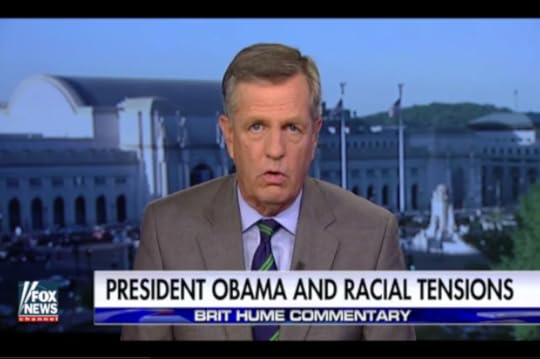
Brit Hume, contributor on Fox News’ “America’s Newsroom,” on Monday criticized President Barack Obama for not “telling the truth about black lives and how they’re lost, and where they’re lost.”
Hume’s comments stem from separate police-involved fatal shootings last week in Baton Rouge, Louisiana, and Falcon Heights, Minnesota. The victims — Alton Sterling and Philando Castile, respectively — were black men.
“I’m not the first one to point out that the streets of Chicago are a killing field in some areas,” Hume argued. “Black-on-black violence, gun violence, mostly, gang violence. The death count out there is tragically high. The president almost never says anything about that.”
“I think … that that myth, that there’s this epidemic of white police violence against blacks, has taken hold in this country. The president has, to some extent, fostered it,” he continued. “I think it would … go a long way, if he were to use his credibility and his enormous megaphone as president to try to put some of these myths to rest.”
As NewsHounds noticed, Hume also peddled his argument on “Special Report” on Monday night and “The Kelly File” on Tuesday night.
Watch below:
Rep. Dana Rohrabacher responds to Salon article about his dealings with the Taliban
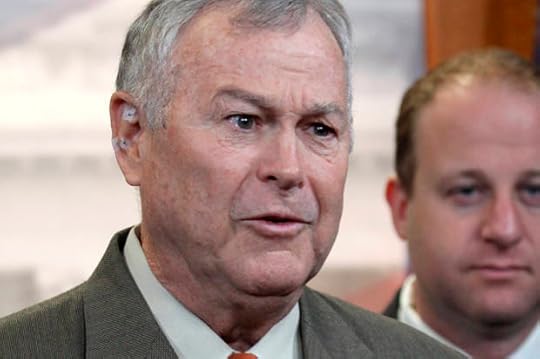
Dana Rohrabacher (Credit: AP/Lauren Victoria Burke)
Published below, in full, is a letter from Rep. Dana Rohrabacher (R-California) in response to Heather Digby Parton’s July 6, 2016 Salon article “Dana and Donald: The California rep would be a match made in twisted-politics heaven for Trump“:
To the editors of Salon:
Re Heather Digby Parton’s fantasy (“Dana and Donald: The California rep would be a match made in twisted-politics heaven for Trump,” Salon, June 6):
I am happy to be the subject of an occasional exercise in journalistic whimsy, still happier to be described as an “individualist,” which, if Ms. Parton would think about it, makes it highly unlikely I would ever find myself in such lockstep as to be a vice presidential running mate for our presumptive nominee.
What pains me as a former journalist is to see one who covers national politics bearing false witness so egregiously. In this case, doing no original research, she simply repeated a scandalously misreported and politically tendentious story from a disreputable throwaway known to have fabricated stories about me and my family.
Did she never learn the need to tell the whole truth?
As an example of her sloppiness – and this should have been a tip-off to Salon’s editors – she linked to a 2002 specimen of journalistic malpractice that appeared in said publication, The O.C. Weekly. But her link itself said it appeared in a more reputable newspaper, “the Orange County register” (lower case hers), my own onetime employer.
A small matter next to the Big Canard, namely that because of a pre-9/11 meeting with the Taliban’s foreign minister I had somehow misread the Islamic fundamentalists’ terrorist intentions, perhaps even felt an “affection” for them. In Ms. Parton’s uncomplicated worldview, out-of-step congressmen apparently are given to such antic and reckless behavior.
Of course, being a serious journalist, she could, nay should, have called me and taken down a far more interesting account. Upon the emergence of the Taliban, then solidifying control over Afghanistan, there was some premature hope, quickly dispelled, that the Taliban would create stability in the aftermath of the Soviet withdrawal. The Taliban, in fact, made a number of commitments to respect human rights and refrain from any involvement in Islamist movements in the region. It took only a few weeks to become clear that those pledges were meaningless and that the Taliban was an evil force.
In a matter of days, I was organizing opposition to the Taliban, especially from remnants of the Mujahedeen and leaders such as the late Commander Masood, who was assassinated two days before the attacks on New York and Washington. My efforts came to fruition after 9/11. Those Afghan leaders became the core of the Northern Alliance, which drove the Taliban from power. Unfortunately, American incompetence has allowed that victory to go to waste.
As far as my meeting with the Taliban foreign minister during that earlier time period, it gave me a chance to demand the Taliban hold free elections and urge them to bring back King Zahir Shah, an Islamic moderate beloved of his people. Such a move would have precluded the folly of installing the corrupt government of Hamid Karzai.
If Ms. Parton thinks congressmen don’t gather information by such means, then she is staggeringly naïve. The pity for her (and for Salon) is this: By settling for a trashy account in a disreputable publication, she stopped short of discovering a more interesting narrative, albeit one diametrically at odds with the impression she wanted to leave.
For Salon’s part, a little more shoe leather, a little more telephone dialing — or even emailing – and a lot less reporting-by-googling – and you would have been able to publish a far more honest piece on a most serious topic.
Rep. Dana Rohrabacher
Forty-eighth District, California
Chairman, House Foreign Affairs Subcommittee on Europe, Eurasia, and Emerging Threats
Heather Digby Parton’s response to Rep. Rohrabacher’s letter is published below:
The information on which this piece was based came from a series of investigative articles published in 2002 by R. Scott Moxley of the Orange County Weekly, a journalist who has followed Congressman Rohrabacher’s career closely over many years. As it happens, on June 28th 2016, Mr. Moxley was named Journalist of the Year and won first place for Commentary by the LA Press Club so Congressman Rohrabacher’s characterization of the OC Weekly as a “disreputable throwaway” is not a widely held opinion in Los Angeles area journalism circles.
This particular story was picked up and discussed at the time by such diverse publications as the right leaning Frontpage Magazine and the left leaning Talking Points Memo. Joshua Marshall, editor of the latter, did some additional investigating and wrote, “I did a little research on this and based on my interviews and wire reports I’ve read, the story is actually true.” I stand by my recitation of these events as reported on the public record. Mr. Moxley has responded to Congressman Rohrabacher’s comments on them as recently as 2011 and would likely be happy to do so again.
[Editor’s note: Heather Digby Parton’s original post has been updated to correct the mistaken attribution of an article to the Orange County Register and accurately credit the Orange County Weekly]
Fears of Trump muddling the electoral map are overblown: His Rustbelt weakness reveals a fundamental vulnerability
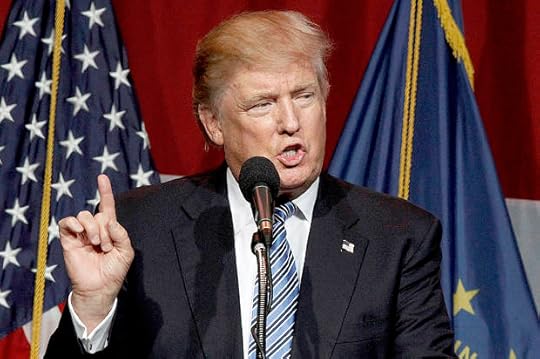
Donald Trump (Credit: Reuters/John Sommers)
The idea that Donald Trump could scramble the electoral college map, putting new states in play has been a recurrent theme in this election cycle. But a June 30 report from Democracy Corps, based on polling from nine battleground states, casts some very cold water on the idea — especially on the underlying notion that Trump is particularly strong among Rustbelt white voters.
Trump’s own claims that he could win in New York or California have raised more chuckles than eyebrows, but the attention Hillary Clinton’s campaign is giving to Pennsylvania is a sure sign that at least the possibility is being taken seriously, not just by the media, but by Clinton herself. The campaign is considering TV ad buys, Clinton has campaigned in the state already, and on Friday will appear with Joe Biden in Scranton, his birthplace. Democrats have carried Pennsylvania comfortably every election since 1992, with an average margin of 6.8%, so this is definitely sign of something unusual happening. At least it would be, if…
According to one school of thought, Trump’s appeal to working-class white voters, combined with the impact of trade deals on the Rust Belt gives Trump a real shot at winning states like Pennsylvania and Michigan, where Democrats have won since 1992 with average margin of 9.2%. But Democracy Corps polled likely voters in nine target battleground states, and found that Trump was significantly weaker among white voters in the Rustbelt (Pennsylvania, Ohio, Wisconsin, Michigan, New Hampshire) than he was in more diverse states (Arizona, Florida, Nevada, North Carolina). He still carried them, but with much weaker margins:
White voters make up 81% of the Rustbelt target state electorate, but only 67% of the diverse state electorate, so Trump gains most support among whites where their political power is growing weaker. In the long-term, this sets up the potential for the exact same dynamic which turned California solid blue following the Proposition 187 campaign in 1994. Right now, however, Clinton’s lead is eight points in both sets of states: 47-39 in the diverse states, 44-36 in the Rustbelt. Signs of a battleground shakeup are noticeably missing.
From a pure horse-race perspective, a single June poll doesn’t mean very much. But the kind of polling Democracy Corps does is different, because of the kinds of relationships it reveals — and this is one of the most important ones. Either candidate’s fortunes could rise or fall in the months ahead. But Trump-style “us versus them” ethnocentric politics has a long historical pattern of growing more intense when the dominant group’s power is weaker, so this particular finding is both unsurprising in itself, and highly likely to endure through November.
One key reflection of ethnocentrism’s power is that support for social programs declines as the population of “them” increases. For example, the 2001 paper, “Why Doesn’t The US Have A European-Style Welfare State?” cited race as a key factor in its explanation, “Racial animosity in the US makes redistribution to the poor, who are disproportionately black, unappealing to many voters.” It presented data showing the same pattern across nations internationally, and across states within the US: Internationally, the percent of GDP devoted to social spending declines among countries as racial homogeneity declines, and racial fractionalization increases. Within the US, the monthly maximum welfare payment declines among states as the percentage of blacks increases. The pervasiveness of this pattern is a strong indication that Trump’s stronger support in more diverse states is not going to go away before election day. Nor is his relative weakness in Rustbelt states about to disappear, either. This finding by Democracy Corps should be seen as part of the underlying fundamentals of the race. It severely dampens the possibility that Trump could dramatically restructure the electoral college map.
But this finding is supported in other ways as well. Back in early May, Sam Wang, proprietor of the Princeton Election Consortium, considered the possibility in a post titled, “Trump expands the battleground…to Utah and the Deep South.” As usual, Wang considered several different ways of approaching the question, but all pointed generally in the same direction: what little evidence of a shifting battleground existed, it tended to disfavor Trump. This was perhaps shown most clearly in following chart plotting state polls at that time against the 2012 election results:
Utah was the state Romney did best in — by far. But Clinton held a slight edge over Trump. Aside from that, the state polls were remarkably similar to where the 2012 election results had been. Trump did show a modest gain in New York, but it still looked on track to be Clinton’s strongest state, of those that had been polled to date. This is not to say that things can’t change, of course. But outside of Utah running away from Trump, no such signs of change have yet appeared.
Wang’s wide-angle approach is the perfect complement to Democracy Corps’ findings. Both argue that Trump’s supposed strength is illusory, while his weaknesses is real. But that’s not to be complacent about the longer view, or the larger picture. The House remains severely gerrymandered, and another four years of stalemated government could make the 2020 election the one that really shakes things up.
Israeli military’s new chief rabbi implied soldiers can rape in war, as government lurches to far-right

Israeli troops deploy during an army operation at West Bank village of Salem, May 30, 2016. (Credit: AP/Majdi Mohammed)
The man chosen as the Israeli military’s new chief rabbi has previously implied that soldiers would be permitted to rape women in war.
This comes at a time when the Israeli government lurches further and further to the right, with what has been called “its most hard-right government ever.”
Rabbi Col. Eyal Karim was nominated for the top religious position in the Israel Defense Forces, of IDF, by the chief of staff on Monday.
Karim was at the center of a media controversy in Israel in 2012, when it was revealed that, in 2003, he suggested on a religious website that soldiers were permitted to commit acts of rape during wartime.
“One of the important and crucial values in war is maintaining the fighting preparedness of the army … and the needs and emotions of the individual are pushed aside for the success of the nation at war,” he wrote in his response to a question about soldiers raping civilians in war.
“Just as in war, the fence of risk-taking is breached on behalf of others, so are the fences of modesty and kashrut breached… Although fraternizing with a non-Jewess is a very bad thing, it is allowable in war out of consideration for the difficulties of the fighters,” Karim continued, according to a translation in the Israeli media.
“Because the success of the collective is what mostly concerns us in war, the Torah allows the individual to satisfy his lust in the permitted conditions for the sake of the general success,” he concluded.
In 2012, when this statement was widely publicized, Karim insisted it was misunderstood and had been taken out of context. He said he did not condone rape.
Karim has also previously argued that women should not be allowed to serve in the army.
On Tuesday, Karim released another statement saying that he opposes rape and now supports allowing women in the military.
Left-wing Israeli politicians condemned Karim’s appointment. Zahava Galon, leader of the Meretz party, said Karim “is not suited to represent Jewish ethics in any way, shape or form.”
“His appalling, racist and violent statement [regarding women] would be unacceptable in any instance of an appointment to a senior position,” she added, in comments reported by Haaretz.
Lawmaker Aida Touma-Suleiman, the head of the Committee for the Advancement of Women’s Status, warned that Karim could likely create more “misogynistic interpretations of this kind.”
This backlash led the IDF to temporarily reconsider his appointment. The Israeli military said it did not know about Karim’s past statements and did not do a thorough background check.
The IDF spokesperson’s office, however, insisted to the Israeli media on Tuesday that it has no intention to cancel Karim’s appointment. On Wednesday, IDF Chief-of-Staff Gadi Eizenkot made it clear that Karim will be the army’s chief rabbi.
U.S. social justice group Jewish Voice for Peace, or JVP, expressed outrage at the news. Rabbi Alissa Wise, deputy director of JVP and founding co-chair of the organization’s rabbinical council, condemned the nomination of Karim.
“The fact that someone who has encouraged the rape of Palestinian women, and who holds such demeaning, blatantly racist and violently sexist ideas, could be considered as a candidate for chief rabbinate of the Israeli military speaks volumes about the lack of respect for Palestinians and other non-Jews the Israeli government and society is willing to tolerate, his current apology following public attention notwithstanding,” she said.
“It exposes just how far the Israeli state has veered away from the ethical underpinnings of Jewish tradition in favor of ethnocentric militant nationalism,” Rabbi Wise added.
In 2014, a similar controversy erupted when an Israeli professor and former IDF intelligence official insisted that only rape can stop Palestinian militants.
Mordechai Kedar, a professor in the department of Arabic at Israel’s Bar-Ilan University who served in military intelligence for 25 years, insisted in an interview on an Israel Radio program, “The only thing that can deter terrorists… is the knowledge that their sister or their mother will be raped.”
“You have to understand the culture in which we live,” he added. “It sounds very bad, but that’s the Middle East.”
Israel is one of the U.S.’s closest allies, and receives more military aid than any other country in the world, by far.
Since 1967, the U.S. has given Israeli military more than $100 billion in aid.
Every year, the U.S. gives Israel more than $3 billion in unconditional military aid, and the Obama administration is considering increasing this figure.
Israel’s current government is the most right-wing in its history. In May, former Prime Minister Ehud Barak warned that his country has been “infected by the seeds of fascism.”
“What has happened is a hostile takeover of the Israeli government by dangerous elements,” he cautioned. “And it’s just the beginning.”
At the same time Barak made these remarks, former Defense Minister Moshe Ya’alon resigned, after hard-line right-wing Prime Minister Benjamin Netanyahu offered the defense minister position to Avigdor Lieberman, one of the most extreme figures in Israeli politics.
Lieberman was compared to ISIS in March 2015, after he publicly called for beheading disloyal Palestinian citizens of Israel.
Explaining his decision to step down, Ya’alon, a fellow member of Netanyahu’s ruling right-wing Likud party, said “extremist and dangerous elements have taken over Israel.”
5 times “Girls” creator Lena Dunham took a stand

Lena Dunham (Credit: AP/Danny Moloshok)
On Tuesday, “Girls” creator Lena Dunham promoted an idea first floated by producer Tami Sagher — to remove all the guns from ads on the New York subway system for the new Matt Damon film “Jason Bourne.” Sagher posted the following on Instagram:
A photo posted by Tami Sagher (@tulipbone) on Jul 12, 2016 at 3:32pm PDT
Dunham agreed enthusiastically, calling it a “good idea” and urging her follows to get on it.
This is not, however, the first time Dunham has taken a stand:
1. She rallied behind Kesha after a Manhattan Supreme Court judge refused to cancel her contract with the producer Kesha accused of raping her
“Kesha says that for ten years Gottwald drugged, raped, and emotionally abused her and controlled her creatively and emotionally through threats and manipulations,” Dunham wrote. “What’s happening to Kesha highlights the way that the American legal system continues to hurt women by failing to protect them from the men they identify as their abusers.”
2. She defended Jennifer Lawrence for speaking out about the wage gap in Hollywood
“‘I’m sick of trying to find the adorable way to say something’ is such a relatable statement. It’s so painful when I look back and think about all the moments that I minced words because of the fact that I didn’t want to be perceived as a bitch, a diva, or an a–hole,” she said. “If Jennifer Lawrence has dealt with it, just imagine what the negotiating process is like for a female actor who doesn’t have her level of leverage.”
3. She attacked the editorial cruelty of publications like Gawker and Jezebel
“I used to read Gawker and Jezebel in college and be like, ‘I can’t wait to get to New York where my people will be to welcome me,’” she said. “And it’s like, it’s literally, if I read it, it’s like going back to a husband who beat me in the face — it just doesn’t make any sense.”
4. She temporarily quit Twitter in 2015 to protest the social media site’s refusal to do anything about its culture of trolling
“I deleted Twitter because I’m trying to create a safer space for myself emotionally,” she said. “People like, threaten my life and tell me what a cow I am. So I decided I was gonna quit. I check it occasionally, but it isn’t the same co-dependence Twitter and I once shared. It’s the dark side of the internet.”
5. She defended Taylor Swift after Kanye West included a nude wax lookalike of her in an art installation
“I don’t have a hip cool reaction,” she wrote on Facebook, “because seeing a woman I love like Taylor Swift (f__k that one hurt to look at, I couldn’t look), a woman I admire like Rihanna or Anna, reduced to a pair of waxy breasts made by some special effects guy in the Valley, it makes me feel sad and unsafe and worried for the teenage girls who watch this and may not understand that grainy roving camera as the stuff of snuff films.”
Time to move on: Sanders has endorsed Clinton, but some of his backers are still pointlessly raging against reality

Bernie Sanders and Hillary Clinton stand together during a campaign rally in Portsmouth, New Hampshire, July 12, 2016. (Credit: Reuters/Brian Snyder)
Bernie Sanders ran an extraordinary race. But he lost and Hillary Clinton is the Democratic nominee. Thus we have two choices in November: Trump or Clinton. Yes, I know who Jill Stein and Gary Johnson are, but neither of them will be president. This isn’t ideal. We ought to have more than two plausible choices. But we don’t. Sanders supporters can engage with that reality or they can ignore it. In either case, we have to confront it.
On Tuesday, Sanders did what we always knew he would do: He endorsed Hillary Clinton. Because that’s what adults do in a democratic society once they’ve lost a campaign to a member of their own party. It’s also what someone committed to progressive goals would do. Clinton is not a progressive by any measure, but she’s closer to Sanders than Trump on nearly every issue of import. She’s also not an ethno-nationalist whose knowledge of the world is reducible to half-remembered sound bites. But I digress.
Sanders summed it up nicely:
“This election is about which candidate will nominate Supreme Court justices who are prepared to overturn the disastrous Citizens United decision which allows billionaires to buy elections and undermine our democracy; about who will appoint new justices on the Supreme Court who will defend a woman’s right to choose, the rights of the LGBT community, workers’ rights, the needs of minorities and immigrants, and the government’s ability to protect the environment…This campaign is about moving the United States toward universal health care and reducing the number of people who are uninsured or under-insured. Hillary Clinton wants to see that all Americans have the right to choose a public option in their health care exchange, which will lower the cost of health care. She also believes that anyone 55 years or older should be able to opt in to Medicare and she wants to see millions more Americans gain access to primary health care, dental care, mental health counseling and low-cost prescription drugs…”
Clinton does not represent change. She’s of the system and has exploited it as much as anyone. But Sanders is right: She has vowed to fight on all these crucial fronts. Perhaps you don’t trust her – fine. But is there any reason to trust Trump? When so many lives hang in the balance, why roll the dice? Casting a meaningless protest vote may feel righteous, but it won’t help poor people get health care and it won’t ensure that women have autonomy over their bodies for the next fifty years. And when Trump has all but promised to deliver the Supreme Court to movement conservatives, voting to “blow up” the system isn’t noble; it’s irresponsible.
Predictably, there’s a contingent of Sanders supporters, the Bernie or Busters, who aren’t buying it. Almost on cue, they took to the internet yesterday to lambaste their former hero and charge him with betrayal. Sanders’s Facebook page was littered with petulant lamentations. “Intelligent Bernie supporters will NEVER support her because she stands for everything we’re fighting against,” one wrote. Another said: “You chose her over us. Truly shocked and saddened by this.” “You broke my heart and betrayed the left Senator Sanders,” another posted. At the rally itself, several Bernie fans walked out as Sanders endorsed his former opponent. And there are reports that disillusioned Sanders voters are planning a “fart-in” (yes, you read that correctly) at the convention, to show the Democratic Party just how much they think Hillary stinks.
This is ridiculous, of course. It won’t accomplish anything and it demonstrates how delusional this element of Bernie’s base is. “She stands for everything we’re fighting against.” Really? What about the long list of policies Sanders cited yesterday? Clinton and Sanders’s positions are indistinguishable here. “Truly shocked and saddened by this.” Really? At the very first debate, Sanders said “Hillary Clinton will be an infinitely better candidate and president than the Republican candidate on his best day.” And you’re “shocked” he endorsed her over the worst Republican candidate imaginable?
I’ve made no secret of my support for Sanders. But Clinton won, and it wasn’t merely because of superdelegates. She won because more people voted for her – period. Pretending otherwise is pointless. So what to do? Make no mistake: a progressive vote for Stein or Johnson is a default vote for Trump. All the rancor about the “lesser of two evils” approach won’t change that fact. The Sanders-Clinton arguments are immaterial now. Sanders won’t be on the ballot.
If this wasn’t a cult of personality, if it was actually about making the Democratic Party more progressive, then the Sanders campaign has already succeeded. No, you won’t get everything you want. No, our process won’t be transformed overnight. But that was always the case, no matter the outcome of this nomination battle. Change happens incrementally. As president, Sanders would confront the limits of our system like everyone before him, and many of his policies would’ve died a quick death in Congress – that’s the reality. He understood this all along, which is why he’s called for a grassroots movement to keep the focus on Congressional races beyond November.
The truth is that Sanders has already put his stamp on the party. He’s won policy concessions from the Democratic platform committee on key issues, and there will be a price to pay if they backtrack. He’s now one of the most important voices in the party. Clinton may be the nominee, but she’s been forced to absorb part of Sanders agenda, and that’s a tremendous victory for him and his supporters.
If that’s not enough, the brute fact remains: it’s Trump or Clinton. An experienced Democrat who aligns with liberals on most issues and will make hugely consequential SCOTUS nominations or a race-baiting TV huckster who thinks climate change is a Chinese hoax and has vowed to build walls and ban Muslims.
Is that really a choice?

